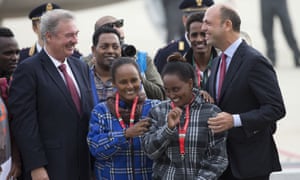Twenty Eritreans have been flown from Rome to Sweden in the first move under a new and bitterly contested system of EU quotas for sharing 160,000 refugees.
The European migration commissioner, Dmitris Avramopoulos, and the Italian interior minister, Angelino Alfano, escorted the group to the airport.
“Today is a day of victory for Europe,” Alfano told reporters as the jet took off. About 100 other asylum seekers will be sent to countries including Germany and Holland in the coming weeks, he said. Avramopoulos said the relocation was “a tangible example of what we can do if we work together”.
However, diplomats working on the quota policy say it is almost impossible to identify potential beneficiaries among the 600,000 people who have entered the EU this year because most refuse to be registered at the point of entry in Greece or Italy and do not want to be relocated to arbitrary countries on a quotas list.
Avramopoulos will visit an immigration centre that will be run jointly by EU and Italian officials – called a “hotspot” – on the Italian island of Lampedusa on Friday before moving on to Greece to review its own hotspot plan.
People who qualify for relocation are Syrians fleeing civil war, Eritreans escaping forced military service and Iraqis overrun by Islamic State militants.
The EU budget will give €6,000 (£4,450) per head to the country that accepts the refugees, while the country that is transferring them will get €500 each to pay for their transfer.
On Thursday, European governments decided on tentative steps towards common immigration policies in response to the refugee emergency, opening talks on surrendering national control of borders to new EU authorities and calling for more and quicker deportations of refused asylum seekers.
